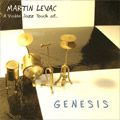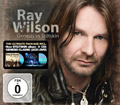


Two years after his last solo album, Nad Sylvan, amongst other jobs the singer in Steve Hackett's band, released a successor in April 2021. While he explored the prog road on the three albums of the Vampirate-trilogy, he is now breaking new ground with his new release, Spiritus Mundi.
With The Regal Bastard, Nad found a conciliatory ending for Vampirate; when this story was concluded, the question arose as to what he would release next.
Spiritus Mundi, which can be loosely translated as "Spirit of the world", is quite different in style from the Vampirate albums and is thus comparatively far removed from what is commonly understood as progressive rock – the new direction is more acoustic, quiet and folky. This means that the album loses some of its complexity and diversity; but at the same time it opens up new possibilities for the album's straightforwardness and unity.
This new style is largely related to the subject matter of the album: Spiritus Mundi is a concept album in which Nad has set poems by the Irish poet William Butler Yeats to music. The story has not been conceived by Nad himself this time, but it is the musical realisation of already existing lyrical material. Since many of the poems belong to the Romantic period, a rather calm and harmonious overall sound seems appropriate.
 The project began when American songwriter Andrew Laitres contacted Nad. He was working on a setting of Yeats’s poem The Lake Isle Of Innisfree, and he asked Nad to sing it. Eventually the song ended up as a bonus track on The Regal Bastard and in its way it certainly gives you an impression of what Spiritus Mundi sounds like as a whole. Though is has been labelled a solo album by Nad, it is perhaps rather a collaboration between Nad and Laitres who wrote the majority of the album together. Laitres also sings lead vocals in a few places. You can hear, though, that the album was tailored to Nad's style of singing.
The project began when American songwriter Andrew Laitres contacted Nad. He was working on a setting of Yeats’s poem The Lake Isle Of Innisfree, and he asked Nad to sing it. Eventually the song ended up as a bonus track on The Regal Bastard and in its way it certainly gives you an impression of what Spiritus Mundi sounds like as a whole. Though is has been labelled a solo album by Nad, it is perhaps rather a collaboration between Nad and Laitres who wrote the majority of the album together. Laitres also sings lead vocals in a few places. You can hear, though, that the album was tailored to Nad's style of singing.
As on the previous albums, Nad gathered a number of guest musicians around him: While he himself and Laitres play most of the instruments, Tony Levin is back for four songs and so is Jonas Reingold for one on bass. The drums are not played by Nick D'Virgillio this time, but by Mirkko de Maio, the drummer of the "Flower Kings". Steve Hackett plays the 12-string guitar on one of the two bonus tracks only, so he has not been invited for a solo this time. In fact, there are pretty few solos on the album anyway. Accordingly, these are also rarely played on electric instruments. Instead, they are performed, for example, by the Kiwi Te Kanna on the oboe or the Chinese flute.
There are nine poems set to music on the album with a running time of under 45 minutes.
The Second Coming (7:00)
The opener begins with a sound collage of strings, marimba / xylophone, choir and spoken word - an interesting introduction that makes you sit up and take notice. This intro finally leads into the actual song, which is actually quite straightforward. The rhythm builds on the acoustic guitar and characterises the longest track on the album. Even here at the outset of the album, it is mad clear that the vocals are in the foreground. A strong start that sets the course for the whole album!
Sailing to Byzantium (6:41)
A loosely tinkling piano introduces the next song. Again, an acoustic guitar rhythm is introduced, before Sailing to Byzantium slowly builds up over polyphonic vocals with a lot of reverb, appearing mysterious and slightly ethnic at the same time. Spot how well Nad's vocals harmonise with those of Laitres, who takes over part of the lead vocals.
Cap and Bells (4:47)
... begins with nature sounds and an a cappella interlude by Nad. The plucked guitar then fades in and is quickly joined by further layers of strings, accordion and background vocals, before the song becomes more rhythmic with the introduction of the bass about halfway through the song. The use of the harpsichord is an apt idea that gives the whole thing a slightly medieval impression. A somewhat lighter track than the previous two.
The Realists (2:18)
The short The Realists continues a bit more restrained, its dark strings at the beginning reminding us of Steve Hackett's recent albums. Without a long introduction, a playful track develops, again characterised by acoustic guitar and harpsichord. The very clear lead vocals of Laitres are striking. As Nad mentioned, he creates a sound not unlike Roger Hodgson’s. After his vocal part the song moves on into ...
The Stolen Child (4:58)
This song was released as a single and is overall relatively catchy and upbeat. Regular bass and drums / percussion are in the foreground here. The Stolen Child fits well into the overall concept of the album, but remains a little more inconspicuous overall. It is orchestrated quite excitingly with the accordion in the middle section and the plucked acoustic guitars that try to stand up to the booming bass.
To An Isle In The Water (4:36)
As the title suggests, this song is even more dreamy than most of the album. Nad's polyphonic vocals are very appropriately combined with guitar, xylophone and strings. Above all, however, the oboe, which solos in the background, contributes to the dreamy soundscape. The very quiet song fades out before fading in again briefly for a solo part with Chinese flute.
The Hawk (4:09)
The Hawk was also released as a single with a video and is much livelier than the previous one. The nervous drums in the background are especially noticeable and the bass gallops harder and harder in the course of the song. Nad uses his voice as an additional instrument alongside the text passages. A successful song that is a bit faster than the rest of the album.
The Witch and The Mermaid (1:57)
While this is the shortest track, The Witch and The Mermaid does not lose any of its independence, but fits into the album as a fully-fledged song. It remains largely unremarkable, though it offers an instrumental section with guitar, flute and choir between the vocal parts.
The last song stands out a bit from the rest of the album: the rhythm is set by lively drums and keyboards, before a striking bass carries the song along. In the middle, a rare guitar solo is heard before the song calms down and Laitres takes over the vocals once more. Slightly anthemic and without too much pathos, The Fisherman brings the album to a close.
Thus ends a remarkable and courageous album. Courageous above all because Nad has found a style for the concept and carries it through consistently over the length of the album. In addition, the record stands out from its predecessors and will certainly leave some fans who liked the proggy side of Nad wondering. Nad cannot be accused of stagnating as an artist or of a lack of development. It is quite to his credit that he ventures into new musical territory.
Due to the subject matter, the album lyrics are, of course, quite superior. Musically it remains on a similar level: compositionally it is not too complex, but employs a lively instrumentation. Even though many tracks are relatively similar, especially due to their structures with acoustic guitar, it doesn't get boring and once you get into the calm overall sound you don’t miss any hectic bits. It is also somewhat reminiscent of Steve Hackett's current Under a Mediterranean Sky, which also captivates the listener with a rather indulgent backdrop.
This album is the logical next step for Nad, away from Vampirate and towards other aspects of his musical identity. However, you can compare this album and the Vampirate trilogy only to a certain extent; Spiritus Mundi is musically too stubborn for that, but it offers a stylish, coherent sound that fits the theme, which is optimally supported not least by the flawless production.
By Ole Uhtenwoldt (April 2021), English by Martin Klinkhardt
Photos courtesy of InsideOut



Brand new album by Martin Levac. Contains eleven Genesis-classics in Jazz style.



Package with live 2CD/DVD and new Stiltskin album. Available also as MP3 album.